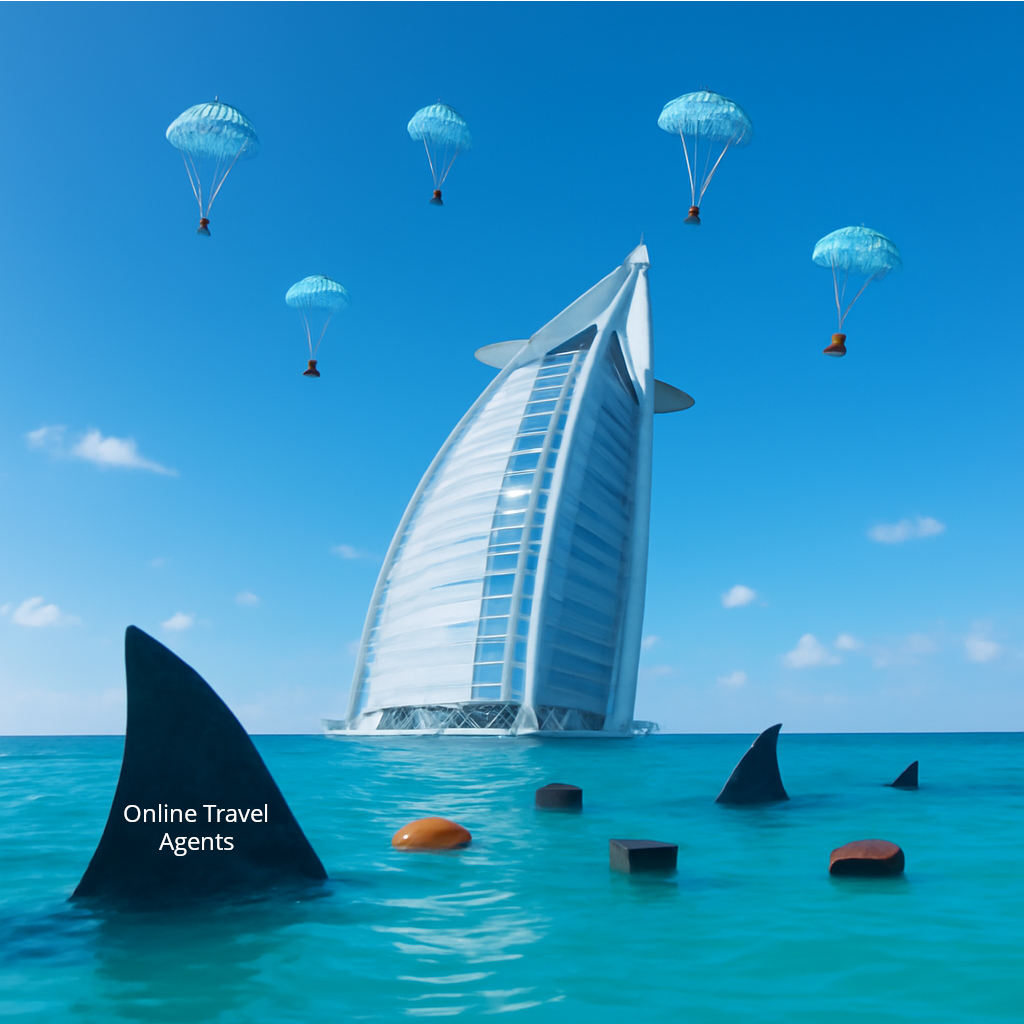Booking direct shouldn’t require a leap of faith over shark infested waters…(the good news is the OTAs are losing)
Executive Summary (the short read)
The OTA Business Model is Weakened
OTAs are no longer the only game in town—hotels now have access to the same advertising channels and powerful direct booking tools previously reserved for OTAs.
Recent changes in privacy laws have disrupted how OTAs track effectiveness and collect data for targeting bookers.
Race to the Bottom Hurts Hotels:
OTAs’ push for lower rates often forces hotels into offering ever-deeper discounts, heavily eroding average daily rates and profits.
Technology solutions that automatically undercut rates often make this problem worse, leading to a destructive race to the bottom.
Hotels Using Intelligent, Human-Led Strategies Win:
The most successful hotels now take a tailored approach—optimizing advertising, room categories, and demand periods at an individual property level.
Real-time, detailed rate auditing empowers hotels to find and fight unauthorized rate leaks, rather than blindly discounting.
Personalized management outperforms generic, AI-driven portfolio approaches, preserving revenue and hotel brand value.
Direct Bookings Deliver Higher Value:
Hotels leveraging advanced digital tools and expert management are growing their average daily rates, selling more premium room types, and capturing higher volumes of direct bookings at a lower cost than OTA channels.
OTAs Are No Longer Essential Gatekeepers:
The scale advantages once enjoyed by OTAs are eroding as hotel groups and digital platforms fragment and bookers prioritize unique experiences.
The future belongs to hotels that assert control over their digital presence, pricing, and guest experience.
Hotels no longer need to over-rely on OTAs or resort to indiscriminate discounting to remain competitive. By embracing intelligent, individualized revenue management and digital marketing, hotels can protect their margins, enhance their brand, and achieve sustainable long-term growth in direct bookings.
The long read
Six years ago, hotels were relying heavily on Online Travel Agents to deliver the lion’s share of their online bookings. That relationship hasn’t changed: OTAs continue to be essential partners for revenue generation, but what has changed is that ‘partner’ definition. It has become increasingly tenuous, especially when you look at what they are doing to hotels under that same ‘partnership’ umbrella. It hurts hotel's when they give everything to OTAs. That’s what we stop. In this post we’ll explain what OTAs don’t want you to know, and the opportunities we see operating on a hotel’s behalf to capture direct bookings.
What the OTAs don’t want to admit
The OTA model has come under significant strain, and this has been caused by a combination of factors: some relate to rate management, while some represent existential threats to their operation. This is not to be underestimated.
First, OTAs have always needed to have the lowest rate to be successful.
Changes in hotel rate optimisation, like dynamic pricing and gated rates, combined with hotels having more and more access to advertising platforms (previously dominated exclusively by OTAs), mean OTAs now have fewer chances to capture the booker. We are running room revenue campaigns that appear before OTA ads, helping hotels secure valuable direct bookings and significant revenue as a result.
Another cause of pain for the OTA model relates to privacy. In the past there were fewer concerns about how companies were collecting and using personal information for commercial gain. Now that concern is in the public domain. This change means that many larger travel companies and providers find themselves struggling to adapt to the growing range of privacy measure they are legally required to follow. For example, measures in the travel advertising space make it much harder to track the efficiency of a campaign against the revenue it has delivered.
How we help hotels become the speedboat
Hotels using our services are free from the privacy restrictions, plaguing the larger operators, because we are not interested in collecting personal data, we are only interested in collecting revenue. This change in focus gives our hotels more flexibility. A second advantage our hotels have over OTAs is that we optimise each hotel individually, not as part of a larger portfolio of properties.
What this means is that our hotels move like a speedboat taxi service weaving through a busy harbour picking up bookers, while OTA cruise ships remain immobile waiting to dock.
What changed?
OTAs lost their value added
If you do a comparison across OTA channels today, you’ll see that they are mostly matched on price. That’s not lost on people booking either. If they see two prices that are the same, they’ll be more inclined to search out a third-offer. Combine that situation with our advanced advertising technology that pushes OTAs out of the advertising spots they used to occupy all the time, camping on your hotel’s brand name. It’s where we take back market share.
How the OTAs responded?
OTAs invested in loyalty clubs and asked hotels to add unique experiences, they could then offload onto bookers to try and get them to transact. They even made impassioned cases to hotels to give them mobile rates.
We know, as do the hotel Revenue Manager’s, that behind every new feature being proposed by an OTA, that it’s going to lead to an undercutting of the hotels direct booking channel.
Impacts on the rate marketplace of today
For the hotel: what used to be a 15% discount, now needs to be as much as 30% just to hold price competitiveness with an OTA.
For the OTA: benefiting from thousands of new loyalty club subscriptions, lower advertising costs because they’ve convinced hotels that people book on mobile, where it was simply a means to get access to new customers without losing their commission margins, and having the hotel pick up the tab.
It doesn’t have to be like that.
Revenue Managers using our services get access to our proprietary rate-auditing tools (they go much deeper than industry price matching technologies that are simply pulling official rates, and telling you what you already sending out via your channel manager - ours tell you the rate).
They spend less time chasing down the rogues because we tell them exactly who’s doing it.
We’re monitoring too, so when one of the leading OTAs decides to push a third-party rate, leaked by a wholesaler, they know so they can bring it up on their next call with them. :)
Drop your rates, give them even more…it’s the only way to survive!
An OTA having to eat into their commissions and fish wholesale rates just to hold price competitiveness, underlines how on the ropes they are. If you think that the best opportunity for your hotel is to drop the prices, or to use a technology solution to magically adjust your lowest rate even lower to win the booking, it’s a race to the bottom you can do without. And it’s not even necessary.
What we do works!
We are growing:
Year on Year ADR
Higher room category sales.
Direct booking volumes.
Direct booking revenues.
And we are delivering these bookings at a fraction of the cost of OTA channels, while strengthening the hotel brand in the process. In addition we give the experts at the hotel – the reservations and sales teams – more opportunities to upsell earlier, leading to more incremental revenues.
The hotel guest benefits too with the spectacular hospitality experience, only your hotel can offer when they book direct.
Stand back and take it in, it’s a good time.
Look at the fragmentation in the hospitality industry, with apartment booking websites now set solid as viable alternative choices to hotels, and compare that to when these channels were outliers. Add in the administrative costs that OTAs are now burdened with having to integrate these channels into their own booking portfolios. Add in the fact that the current and next generation of bookers want unique experiences, not copy and paste travel solutions and it’s really looking pretty bleak at OTA HQ.
Remember that OTAs have always worked best at scale, from running advertising campaigns on hundreds of thousands of hotels, while the hotel focused on the look and feel of their website.
No hotel on earth likes the way they appear on an OTA - largely a branding road-crash that contrasts starkly with the finesse of their own website properties - but people book on OTAs!
That is because practicality trumps all with the online booker, and with every single question answered on an OTA brand page, they book. This is what we are attacking for our Clients, taking even more market share away from the OTAs in the process.
If you think that there’s no point trying to take on an OTA, ask yourself this:
Do you think an OTA can possibly start manually optimising hundreds of thousands of campaigns, if a single hotel decides to go against the flow?
We’re not pretending to replace OTAs, other operators do that which is absurd, and we’re not passively helping hotels; we’re growing their direct revenues and doing this with a level of transparency not seen before.
Get in touch so that we can show how we are making this difference, and how our expert management aligns your peak demand periods and revenue markets to your online audiences.
We are a technology led company that uses humans to manage your revenues, we don’t set AI optimisation rules on auto-pilot, or treat your hotel as an unnamed entity inside a larger portfolio of hotels. That leads to sub-par performance.
For us OTAs are like the faucet on a tap, if it is controlled, they can be really effective partners, if the tap is left to run the hotel brand gets devalued, guests get a worse deal, and the hotels lose their ability to upsell. Hotel revenues will continue to arrive with an ever increasing cost as OTA channels are further squeezed by the market changes, and in turn pass that onto the hotels via higher commission fees.
Reach out to Internet Affected, a unique hospitality company that positions your hotel at the centre of its own digital universe. We can showcase our case studies and hard irrefutable data that gives you a clear line of sight to your revenues and the value added of our services.
About the author
Glyn Spencer Hopkins is the owner of Internet Affected and has been working exclusively with hotels and luxury brands for over a decade.
Internet Affected provides digital revenue services tailored to the individual characters of hotels; a complete range of services designed to help them take back ownership of their hotel brand from the OTAs. Specialized marketing solutions to increase guest loyalty, food & beverage bookings, events and wedding inquiries, clearly reported in straightforward language.











